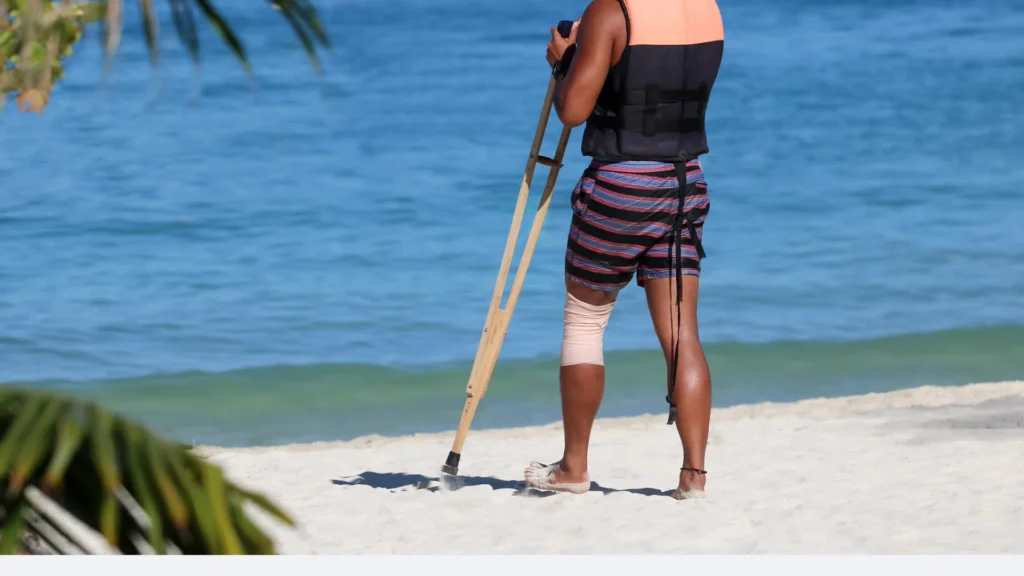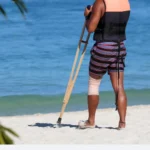Accidents can happen at any time, and while most people tend to think of accidents occurring at home, they can also happen while you’re on vacation. Whether you’re enjoying a relaxing beach getaway, exploring a new city, or embarking on an adventurous trip, being injured while on vacation can complicate the situation significantly. Between the stress of dealing with injuries and navigating a foreign environment, it can be overwhelming to figure out what steps to take next.
In this blog post, we will guide you through what to do if you’re injured while on vacation, including how to manage the immediate aftermath, understand your rights, and ensure you’re compensated for your medical expenses and other losses.
1. Get Immediate Medical Attention
The first and most important step if you’re injured during your vacation is to seek medical care. Regardless of whether your injury seems minor or severe, it’s essential to get assessed by a healthcare professional as soon as possible. Immediate medical attention not only ensures your health and safety but also documents the injury, which will be crucial for your insurance claim or legal case down the line.
Steps to Take:
-
Seek Help Right Away: If the injury is serious or life-threatening, call emergency services immediately. Don’t wait to see if the injury gets worse.
-
Document Your Injury: If you can, take photos of the injury, the accident scene, and anything that may be relevant (e.g., unsafe conditions that caused the accident). These documents may be needed for insurance or legal purposes.
-
Keep Records of All Medical Visits: Ensure you keep detailed records of all your medical treatment, from hospital visits to follow-up appointments and prescriptions. Medical documentation will play a significant role in any insurance claims or lawsuits you pursue.
2. Report the Accident
After seeking medical treatment, the next step is to report the accident to the appropriate parties, whether you’re staying at a hotel, using rental services, or experiencing an incident in a public space. Reporting the accident helps establish the details of the incident and can help protect your rights if you need to file an insurance claim or pursue legal action later.
How to Report:
-
Hotel or Resort: If your injury occurs on hotel or resort property, inform the front desk or management. Make sure they file an incident report and provide you with a copy. This is particularly important for injuries like slip-and-fall accidents or accidents involving hotel amenities.
-
Rental Services: If you’re injured in a rental vehicle or on an excursion booked through a travel company, report the incident to the service provider immediately. They may require you to complete an accident report for their records.
-
Public Places: If your injury occurs in a public space (e.g., a shopping mall, theme park, or restaurant), notify the manager or employee on duty and ask to fill out an incident report.
The accident report will serve as valuable documentation for your insurance claim or potential legal case, establishing that the injury occurred during your vacation.
3. Understand Your Insurance Coverage
Before or during your trip, it’s a good idea to check your insurance coverage to understand how injuries sustained during a vacation are handled. Depending on the type of injury and where it occurs, there may be multiple avenues for coverage.
Types of Insurance to Consider:
-
Health Insurance: If you’re injured while on vacation, your health insurance may cover the costs of medical treatment. However, if you’re traveling internationally, be sure to check if your health insurance extends to foreign countries. Some plans have limited coverage abroad, so you may need travel insurance or additional coverage.
-
Travel Insurance: Travel insurance often covers medical emergencies that occur while traveling, including accidents. If you purchased travel insurance, review the policy to see if it covers medical expenses, medical evacuation, or trip interruption due to your injury. Many travel insurance policies also include emergency medical transportation to get you back home if needed.
-
Rental Insurance: If you were driving a rental car and were injured in a crash, the rental car’s insurance may cover some of the medical costs. However, you will also need to check whether your personal auto insurance policy or credit card insurance provides additional coverage.
-
Liability Insurance: If the injury was caused by someone else’s negligence (e.g., a hotel property manager, tour operator, or theme park), liability insurance through that provider may help cover medical costs and damages.
Reviewing your insurance policy in advance can save you time and stress when dealing with your injury. If you’re unsure of what your insurance covers, reach out to your provider to confirm the details.
4. Who Is Responsible for the Accident?
If you’re injured while on vacation due to someone else’s negligence or fault, you may have the right to file a personal injury claim. Determining who is responsible for the accident is critical in pursuing compensation for medical expenses, lost wages, and pain and suffering.
Potential Responsible Parties:
-
Hotel or Resort: If the injury occurred due to unsafe conditions (e.g., slippery floors, faulty equipment, or inadequate security), the hotel or resort may be liable for your injuries.
-
Tour or Activity Providers: If the injury occurred during an organized excursion or activity (e.g., a sightseeing tour, zip-lining, or a boat trip), the provider may be responsible if the accident was due to negligence, such as poorly maintained equipment or inadequate safety precautions.
-
Rental Companies: If you’re injured in a rental car or while using rental equipment, such as a scooter, bike, or recreational vehicle, the rental company may be liable for injuries resulting from faulty equipment or improper safety instructions.
-
Other Drivers: If you’re involved in a car accident with another driver, the at-fault driver’s insurance may cover your medical bills and damages.
To prove liability, you’ll need to gather evidence, such as photographs of the scene, witness statements, accident reports, and medical records. In these cases, hiring a personal injury lawyer can be incredibly beneficial, as they can help determine liability, gather evidence, and navigate the legal complexities of a vacation injury claim.
5. Legal Rights and Options for Vacation Injury Compensation
When you’re injured while on vacation, you have legal rights that protect you, and you may be entitled to compensation for your injuries, medical bills, and other related expenses. However, pursuing compensation in a vacation injury case can be complicated, particularly if the injury occurred in a foreign country or involved multiple parties.
Legal Steps You Can Take:
-
File a Personal Injury Claim: If someone else’s negligence caused your injury, you may file a personal injury claim to seek compensation for your medical bills, lost wages, pain and suffering, and other damages.
-
Consult a Personal Injury Lawyer: If the injury is serious or liability is unclear, consulting with a personal injury lawyer is important. A lawyer with experience in vacation injury cases can help you navigate the complexities of your case, especially if it involves accidents abroad or if the responsible party is a large corporation, such as a resort or tour operator.
-
Consider Filing a Lawsuit: In some cases, insurance companies may not offer a fair settlement or may deny your claim entirely. If this happens, filing a lawsuit may be necessary to get the compensation you deserve.
Whether the injury occurs on a cruise, during a flight, or while participating in an adventure activity, a lawyer can help you understand your rights, pursue compensation, and hold the responsible parties accountable.
6. Conclusion: How to Protect Yourself During Your Vacation
Getting injured while on vacation is an unfortunate situation that can cause significant disruption to your trip. However, by taking the right steps—seeking medical attention, reporting the accident, understanding your insurance coverage, and consulting a personal injury lawyer—you can protect your legal rights and recover compensation for the damages you’ve suffered.
If you’re planning a vacation, it’s a good idea to familiarize yourself with the risks involved and take precautions to stay safe. Whether it’s buying travel insurance, researching the safety of excursion providers, or being cautious in unfamiliar environments, taking these proactive steps can help reduce the likelihood of injury.
In the event of an accident, don’t hesitate to contact a lawyer who specializes in personal injury cases. They can help you understand your options and ensure you receive the compensation you deserve, even while you’re far from home.









